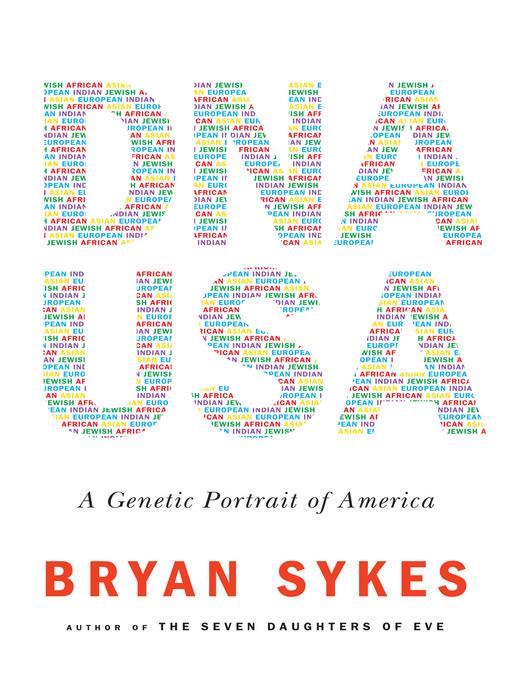
DNA USA
A Genetic Portrait of America
کتاب های مرتبط
- اطلاعات
- نقد و بررسی
- دیدگاه کاربران
نقد و بررسی

March 5, 2012
America’s gorgeous mosaic emerges from its DNA in this fascinating if sometimes muddled treatise on genetics and genealogy. Oxford geneticist Sykes (The Seven Daughters of Eve) traveled across the United States collecting DNA samples, recording family histories, and gazing out the window of his train car. (His evocative landscapes are one of the book’s chief pleasures.) The resulting “chromosomal portraits,” painted by analyzing markers that correlate with African, European, or Asian–Native American populations, reveal DNA tell-tales of unsuspected centuries-old migrations and mixings: Mexican-American Catholics descended from Spanish Jews; white Southerners with substantial African-American ancestry; possible journeys from Europe to North America 10,000 years ago. Sykes gives lucid, entertaining explanations of new genetic techniques and their startling success at tracing familial ties across continents and millennia. But he often flounders in contradictory interpretations as he veers between deploring artificial ethnic categories and subtly endorsing them (“My pancreas functions on a combination of both African and European genes”)—his genetic testing company, Oxford Ancestors, helps British customers peg their forefathers as Viking, Saxon, or Celt. Still, Sykes’s history of hidden kinships and epic wanderings captures the imagination. Photos. Agent: Luigi Bonomi, Bonomi Associates (U.K.).

Starred review from May 1, 2012
Sykes (Human Genetics/Oxford Univ.; Saxons, Vikings, and Celts: The Genetic Roots of Britain and Ireland, 2006, etc.) combines history, science, travel and memoir in one grand exposition of what it means to be an "American." America, writes the author, is "where the genes of three great continents converge." Initially, it was Asian forebears that peopled the new world. Through analysis of mitochondrial DNA, the origins of Native Americans can be traced to three mother clusters arriving from Siberia and a fourth from Polynesia. The arrival dates, based on mitochondrial DNA mutation rates, establish a range of about 16,000 to 20,000 years ago. Unfortunately, high-handed methods toward Native tribes have created a rift that persists today, for what the scientists were doing was destroying beliefs that these natives have existed here forever. Not so for Americans of European or African descent. They know they came from elsewhere and are eager for all the details, as witness the thriving genealogy industry. Geneticists can use mitochondrial DNA as well as y-chromosome analysis, along with the latest DNA chip technologies, including "chromosomal painting." The latter allows experts to pinpoint selected blocks of genes on individual chromosomes that reflect a European, Asian or African ancestor. Traveling cross-country by train and car with his son and back again with a female assistant, Sykes gathered saliva samples for painting analysis. In a graceful text, the author delivers rich images of the American landscape, conversations with strangers, and historic asides on the waves of immigration, the Indian diasporas and the various federal laws that shaped the movements of people across the continent. In the end, Sykes provides the revelations of those salivary analyses: For the most part we are a motley crew, so much so as to give the lie to any idea that there are pure races or ethnicities. For that reason alone, the book should be celebrated. But Sykes should also be applauded for his skills as a storyteller, science expositor, travel companion and compassionate human being.
COPYRIGHT(2012) Kirkus Reviews, ALL RIGHTS RESERVED.

April 15, 2012
An authority on ancient DNA analysis, Sykes (human genetics, Oxford Univ.; The Seven Daughters of Eve: The Science That Reveals Our Genetic Ancestry) provides a nontechnical introduction to how Y chromosomes and mitochondrial DNA may be used to reveal ancestral heritage. Combining in-depth interviews with volunteers along with these genetic techniques, he attempts to create a biological portrait of the United States. Using a travel diary approach to describe his three-month coast-to-coast journey, he introduces the people he meets and reflects on how ancestry and heredity play into our culture, customs, and beliefs. While Sykes acknowledges that the sample is too small to draw significant conclusions, the results provide interesting perspectives on life in early America. Despite the common tendency to categorize, these DNA portraits illustrate the complexity of human inheritance and how difficult it is to assign individuals to distinct groups. VERDICT Examining the influence of ancient populations on current culture rather than on the evolution of specific genetic traits, this volume provides a nice complement to Sam Kean's The Violinist's Thumb. Recommended for general readers with an interest in the interaction of genetics and genealogy.--Tina Neville, Univ. of South Florida at St. Petersburg Lib.
Copyright 2012 Library Journal, LLC Used with permission.

Starred review from April 15, 2012
British geneticist Sykes, whose account of his discovery of the clan mothers of Europe, The Seven Daughters of Eve (2001), became a best-seller, wondered what a genetic portrait of America would look like. He gamely embarked on a coast-to-coast DNA-collecting adventure and learned that the collision between genetics and people's sense of identity can be explosive. After cogently explaining how the record of the past is written in DNA and how it is interpreted, he presents startling findings about Native American ancestry, which stand in profound conflict with traditional beliefs and reopen old wounds. African Americans, by and large, have embraced the revelations of DNA as a remedy to the rupture and erasure of the slave trade, and Sykes was able to reconnect individuals with heretofore lost legacies rooted in specific African regions. He also found that every African American DNA volunteer has Native American ancestry and many have European ancestry, just as many European Americans have African ancestors. Sykes even determined that he and Henry Louis Gates Jr. are closely related. Human genetics energetically elucidated, entertaining travel writing, the fascinating personal stories of DNA volunteers, and Sykes' candid musings on his awakening to the complex emotional and social implications of hidden biological inheritances make for a milestone book guaranteed to ignite spirited discussion.(Reprinted with permission of Booklist, copyright 2012, American Library Association.)

























دیدگاه کاربران